
Published at 19th Oct 2009
Modified at 3rd Nov 2023
Why France Has A Rooster On Its Coins
 The unofficial national symbol of France is the Gallic Rooster. The origin of this symbol can be traced until antiquity, when the region was named by the Romans Gaul (in Latin Gallia). Caesar, in 58-52 BC, conquered all Gaul and made it a Roman province, divided in 3 but still Gaul.
The unofficial national symbol of France is the Gallic Rooster. The origin of this symbol can be traced until antiquity, when the region was named by the Romans Gaul (in Latin Gallia). Caesar, in 58-52 BC, conquered all Gaul and made it a Roman province, divided in 3 but still Gaul.
The Romans also had a word, galus, that was used to describe a rooster. Since it sounded the same, every one thought that Gaul (pronounced with ‘a’ not ‘o’) came from galus.
In the 6th century AD, a Germanic population named the francs came and conquered the Roman province. They were the elite of the new nation and they borrowed their name to the placed that they ruled. But the Rooster was still a symbol of this country.
In the XVI century, more people associated this name with ancient Gaul. And it became an unofficial symbol. The French Revolution associated this symbol with the ancient gauls, the people, while the francs were considered the noblemen. The rooster was from now on the official symbol of the Republic of France with the feminine personification of Marianne.
The rooster was considered, in 1898 during the 3rd republic, to be the appropriate one for the new gold coin of 20 francs. It was designed by Jules-Clément Chaplain in 1898 in rare trial strikes and issued in 1899. It replaced “The Angel” and it was produced until 1914, with the edge DIEU PROTÉGÉ LA FRANCE or LIBERTE EGALITE FRATERNITE.

It was also used for the 10 franc coin. The Rooster coin was one of the most popular in the whole of Europe. The French franc at that time was the most important currency in Europe. The production of these coins stopped in 1914, when the First World War started.
The population was asked to give the gold coins for the war effort and in one of the most popular propaganda poster: a rooster from a gold coin starts moving and attacks a German soldier, panicked.
Like Our Blogs? Sign Up For Email Notifications
Browse Our French Coins
Search the Coin Encyclopedia
Related Auctions
Related Articles
Why Do People Collect Coins? Collectors buy and collect coins for personnel pleasure and enjoyment or for an enjoyable investment. In late 1980s to early 1990s coin collecting was not so popular but now there is a re insurgence in collecting coins.
10th Jun 2009
Silver has been used in coins for centuries. The ancient Romans made silver coins for the Roman Empire but only Rome was allowed to make silver coins and all the countries that were made part of the roman Empire could only produce bronze, not silver coins
24th Apr 2018
From time to time you will come across an ancient coin with a hole on it. Coins that were holed in ancient times are intriguing. Why was this so?
12th Mar 2018
Latest Articles
Washington quarters are 25-cent US coins issued since 1932. The original obverse remains, with dozens of varieties and new reverses. Learn the history, types, key dates, and errors on the iconic coin!
4th Nov 2024
Walking liberty half dollars are 50-cent American coins circulated from 1916 to 1947. The iconic design has been featured on the silver eagle bullion since 1986 and remains sought-after by collectors.
7th Oct 2024
Standing liberty quarters were circulated US coins issued from 1916 to 1930 as part of the Renaissance of American Coinage. Learn the values, varieties, and stories of standing liberty quarters!
9th Sep 2024
Article Categories
Collection of articles providing lots of useful information on coins through the ages.
30 Articles






